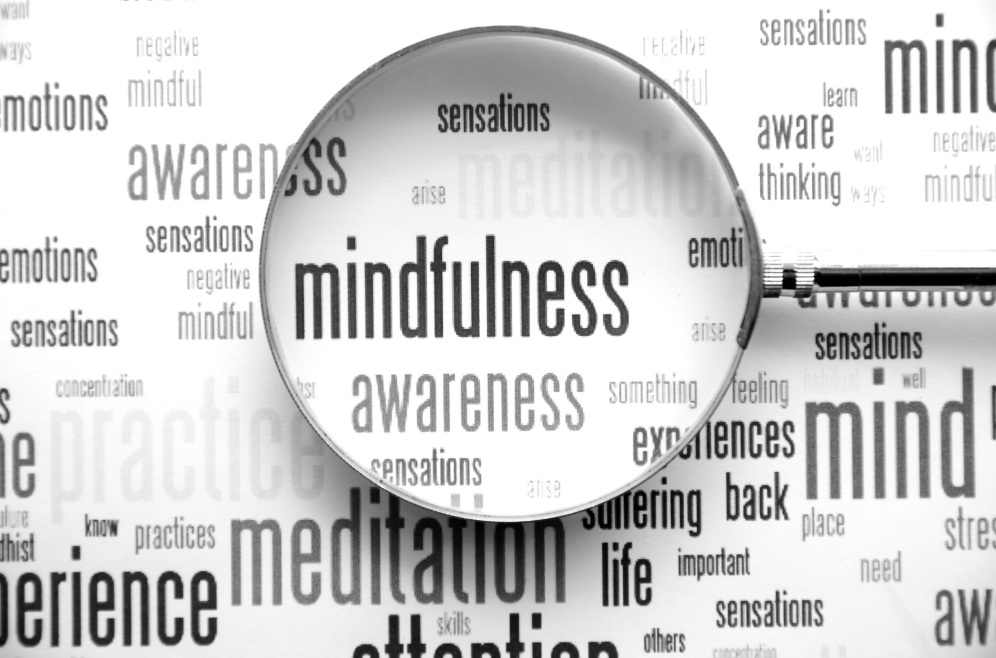The Benefits of Meditation for the Mind and Body
When we look around us today, what we see is a fast-paced, always-connected, and highly complex world. It’s no wonder that people are looking for ways to find balance and well-being and in my opinion, meditation is one of the easiest, most easily accessible, and effective ways to achieve this. Once seen as a niche used for spiritual or religious practices, the benefits of meditation for the mind and body have become widely known and meditation is now used by people everywhere – professionals, athletes, students, and anyone looking for more calm and focus in their lives.

Now, I am not one to preach doom and gloom (as a matter of fact I take pride in being very optimistic about the future, but that is a topic for another day), but I do think we can all agree that the world has become a lot more complicated over the years. From concerns regarding our financial stability, our health and well-being, climate change, future uncertainty, or any number of other challenges, we as humans have no shortage of reasons to worry. But the thing about worry is that it gets us nowhere.
Epictetus – one of the greatest Stoic philosophers – has a famous saying: “Not things, but opinions about things, trouble men.” This basically means that it is never the actual situation that causes us to worry but the way we feel about the situation.
Understanding this, we should all be able to avoid becoming anxious, angry, or agitated ever again, right…? We should be able to remain calm at all times and face our challenges from a place of balance and rationality.
Of course, we all know that’s not how real life works. While this knowledge is undoubtedly valuable, applying it is an entirely different challenge – easier said than done!
Nevertheless, striving for this should be a goal for each of us. And one of the great benefits of meditation is that it helps us on that journey.
But that is just one benefit of meditation. There are numerous others, and as we’ll see in the following, these benefits apply to body and mind alike.
Modern research now confirms what ancient traditions have always known: meditation is good for the mind as well as the body. Countless studies show that it can reduce stress, improve focus, boost emotional well-being, and even help with physical healing.
And given the fact that it is 100% free and easily accessible for anyone, I honestly cannot think of a single reason not to incorporate some form of meditation into our lives.
I understand that for a lot of people, meditation is still a bit of a mystery, and you may feel uncertain about how to approach this practice. So in this post, I’ll share my knowledge on the subject, and explore how meditation works and why it’s so beneficial.
Whether you’re new to meditation or have been practicing for years, I hope this post will help you understand its power and encourage you to make it part of your daily routine for a healthier, more balanced life.

“In meditation, the mind is relaxed, and the body is energized. Together, they create harmony.”
– Unknown
Here’s an overview of what we’ll be diving into:
- What Is Meditation?
-
- Including Different Types of Meditation
- Mental Health Benefits
-
- Stress Reduction
- Improved Focus and Clarity
- Emotional Well-Being
- Physical Health Benefits
-
- Better Sleep Quality
- Pain Management
- Boosted Immunity and Heart Health
- The Science Behind Meditation
-
- How Meditation Affects the Brain
- The Mind-Body Connection
- Supporting Research and Statistics
- How to Get Started with Meditation
-
- Tips for Beginners
- Tools and Resources
- Common Challenges and How to Overcome Them
– And for those of you looking for quick answers:
If you’re in a hurry and don’t have time to read the entire article right now, you can skip ahead to the section at the very bottom to find answers to some of the most commonly searched questions about meditation:
- What Does Meditation Do for the Mind and Body?
- What Happens to Your Mind, Brain, and Body During Meditation?
- What Are 5 Psychological Benefits of Meditation?
- What Are 10 Benefits of Meditation?
But having said that, I would strongly encourage you to bookmark this page and return later to read the full article. After all, knowledge is power! 🙂
And, while we’re at it, I’ll just leave you with this famous quote by Mahatma Gandhi:
“I have so much to accomplish today that I must meditate for two hours instead of one.”
– Mahatma Gandhi
This simple statement clearly shows Gandhi’s deep understanding of something we should all keep in mind: meditation is one of the best ways to improve focus, clarity, and productivity, especially when life gets busy.
But enough yapping from me! Let’s throw ourselves into it…
What Is Meditation?

“Meditation is the secret of all growth in spiritual life and knowledge.”
– James Allen
At its core meditation is a way to focus your mind and find a sense of calm and clarity. It helps you train your mind to slow down, observe your thoughts, and be present in the moment. While it may seem complicated, meditation is, in fact, very simple – all you need is your attention and a willingness to learn.
There are many different types of meditation, each with its own approach. Here are a few common ones:
- Mindfulness Meditation – Focuses on staying in the present moment by paying attention to your breath, body, or surroundings without judgment.
- Transcendental Meditation – Involves repeating a special word or phrase (a mantra) to help the mind reach a deep state of rest.
- Guided Meditation – Uses a teacher or recorded voice to guide you through calming visualizations, breathing, or affirmations.
- Loving-Kindness Meditation – Encourages feelings of kindness and compassion toward yourself and others.
- Movement-Based Meditation – Includes activities like yoga, tai chi, or simply walking, where movement is combined with mindful awareness.
One of the best things about meditation is that anyone can do it. You don’t need special equipment or a specific place – just a few quiet minutes and a (somewhat) comfortable spot. You can meditate in the morning, during a break, or before bed. No matter how busy you are, meditation can be adjusted to work for you, making it a simple, effective, and very accessible way to improve your well-being.
Mental Health Benefits
“Meditation is like a gym in which you develop the powerful mental muscles of calm and insight.”
– Ajahn Brahm
Meditation has so many benefits for your mental health. It is a very effective way to help you feel better emotionally and think more clearly. Adding a simple meditation practice to your daily routine can help you reduce stress, improve focus, and create a more positive mindset.
Stress Reduction

One of the most widely recognized benefits of meditation is its ability to reduce stress. When you meditate, your body’s cortisol levels – commonly known as the stress hormone – start to decrease.
High cortisol levels are linked to anxiety, fatigue, and other stress-related symptoms. Meditation triggers the relaxation response, governed by the parasympathetic nervous system, helping your body and mind relax, and making you feel calmer and more grounded.
Numerous studies back these claims. For example, research from Johns Hopkins University found that mindfulness meditation programs significantly reduced symptoms of anxiety, stress, and depression (for further studies see these links: Natural Relief for Depression, Overall Mental Health ). Or you can simply look for the thousands of personal accounts by everyday people who say that even a few minutes of meditation makes them feel calmer and more balanced. There is simply no doubt that meditation is a useful way to handle one of the biggest health challenges to modern man – everyday stress.
Improved Focus and Clarity
But meditation isn’t just about relaxation – it also helps improve focus and clear thinking. By teaching your mind to stay in the present moment, meditation makes it easier to concentrate, make better decisions, and solve problems.
Mindfulness meditation, in particular, helps improve attention span. A study published in Psychological Science found that just two weeks of mindfulness training could improve the working memory and cognitive flexibility of participants. The research found that mindfulness training reduced mind-wandering, which helps with cognitive performance – simply put, it helps people think more clearly. Even a short time practicing mindfulness can greatly improve memory and focus.
Emotional Well-Being
Meditation is one of the best tools for improving emotional health. It promotes self-awareness and helps you to recognize and manage your emotions more effectively, which means you’ll be less governed by your immediate feelings about a situation and better equipped to take a step back and consider what that situation actually means to you. In mindfulness meditation specifically, you learn to observe your thoughts without judging them. This can also help you let go of negative thinking and see things more clearly. This way meditation can make a big, positive difference in your everyday life.
For those struggling with depression or anxiety, meditation offers hope. Practices like mindfulness-based cognitive therapy (MBCT) have been shown to reduce relapse rates in people suffering from depression by teaching people to observe their thoughts without reacting to them. Meditation also helps people become emotionally stronger, making it easier to face life’s challenges with calm and confidence.
So as you see, From reducing stress to improving focus and emotional well-being, there’s no question that meditation is a great way to support mental health. Whether you’re dealing with daily pressures or looking to understand yourself better, meditation can greatly improve your overall quality of life.
Physical Health Benefits

“Meditation is a vital way to purify and quiet the mind, thus rejuvenating the body.”
– Deepak Chopra
Meditation doesn’t just benefit your mind – it’s fantastic for your physical health as well. By calming the body and promoting balance, meditation supports better sleep, eases pain, and even strengthens your immune system and heart health.
Better Sleep Quality
If you’re sometimes struggling to get a good night’s sleep, meditation can help. By calming the nervous system and reducing stress levels, meditation creates the ideal conditions for restful sleep. Meditation helps your body shift from an active, alert state to a more peaceful and sleep-ready state.
Again, research backs this up by showing that mindfulness meditation practices can significantly improve sleep quality. A study published in JAMA Internal Medicine found that individuals who practiced mindfulness meditation experienced fewer symptoms of insomnia and greater overall sleep satisfaction compared to those who followed traditional sleep education methods.
Pain Management
For those dealing with chronic pain, meditation offers a drug-free way to find relief. By practicing mindfulness, individuals can change their perception of pain, making it feel less intense. Meditation also helps shift focus away from pain and accept it, which can make it less stressful and easier to handle.
Numerous studies back this up. Research published in the Journal of the American Medical Association highlights that mindfulness-based stress reduction (MBSR) programs can significantly reduce chronic pain and improve people’s quality of life. Meditation gives people a way to manage pain on their own without depending only on medicine.
Boosted Immunity and Heart Health
Meditation is also great for your immune system and cardiovascular health. Regular meditation can help lower blood pressure, reduce inflammation, and improve blood flow, all of which contribute to better heart health,
It also strengthens the immune system by reducing stress and promoting relaxation. Chronic stress weakens the immune system, making you more susceptible to illness. By lowering stress and supporting natural healing, meditation helps you stay strong and healthy.
Adding meditation to your daily routine is a simple way to take care of your body. From better sleep and pain relief to strengthening your heart and immunity, its benefits are clear – and again, accessible to everyone.
The Science Behind Meditation

“The goal of meditation isn’t to control your thoughts; it’s to stop letting them control you.”
– Unknown
Meditation may feel like a simple act of sitting in silence, but beneath the surface, it creates big changes in your brain and body. Modern science has uncovered how meditation reshapes the mind and enhances overall well-being, proving that its benefits are real and backed by science.
How Meditation Affects the Brain
Meditation fundamentally changes the brain’s structure and function through a process called neuroplasticity – the brain’s ability to reorganize itself by forming new neural connections. Research shows that regular meditation can increase gray matter in parts of the brain that control emotions, memory, and decision-making, like the prefrontal cortex and hippocampus.
One notable study published in NeuroImage revealed that long-term meditators had greater cortical thickness in areas of the brain related to attention and sensory processing. Mindfulness meditation also helps calm the brain by reducing activity in the amygdala, which controls fear and stress. This leads to a more relaxed and peaceful state of mind.
The Mind-Body Connection
It should come as no surprise to most people that our mental and physical health are closely connected. In my own work in mental health I see this every day. And meditation benefits both. A healthy mind directly contributes to a healthier body. An example I’ve mentioned a few times in this text is that meditation lowers stress hormones like cortisol. Too much cortisol can cause inflammation, weaken the immune system, and lead to health problems. By reducing stress, meditation helps the body heal and stay strong.
Additionally, meditation encourages better sleep, improved digestion, and balanced energy levels, all of which support physical health. The deep breathing and relaxation often practiced during meditation activate the parasympathetic nervous system – the body’s rest and recovery system – helping the body rest and recover.
Supporting Research and Statistics
Scientific evidence underscores meditation’s transformative impact. A study published in Frontiers in Human Neuroscience found that participants who practiced mindfulness meditation for just eight weeks experienced measurable increases in gray matter density in the brain’s hippocampus and other regions involved in emotional regulation.
Another study in Psychosomatic Medicine highlighted that mindfulness-based stress reduction (MBSR) programs significantly lowered markers of inflammation in participants, demonstrating how meditation helps reduce the physical toll of stress on the body.
In short: Meditation helps shape the brain and creates a strong connection between the mind and body, making it a great tool for overall health. And science clearly proves this . With so many benefits – and zero risk – there really is very little reason not to give it a try.
How to Get Started with Meditation

“Quiet the mind, and the soul will speak.”
– Ma Jaya Sati Bhagavati
As I’ve mentioned a few times one of the great things about meditation is the easy accessibility. This also applies to beginning a meditation journey, which isn’t as complicated as you might think. It really only takes willingness and a few simple steps to learn. Below you can find some tips on how anyone can easily make this useful practice part of their daily life.
Keep it simple!
Like with any other habit, starting small, keeping it simple, and setting realistic expectations are key to building a sustainable meditation practice. Here are a few beginner-friendly tips:
- Start with Short Sessions: If you’ve never done meditation before sitting in silence for as little as a couple of minutes might be a challenge in itself. Embrace this fact and begin with just 3-5 minutes a day. Focus on building the habit first and gradually increase the duration as you grow more comfortable.
- Choose a Comfortable Space: Find a quiet, distraction-free area where you can sit or lie down comfortably.
- Focus on Your Breath: A simple way to start is by observing your breath – notice the sensation as you inhale and exhale or simply count your breaths.
- Experiment with Methods: Try different types of meditation, like mindfulness, guided meditation, or body scan, to discover what resonates with you.
- Be Patient: Meditation is a skill to be learned like anything else. Don’t worry if your mind wanders, because it will! 😉 Simply bring your focus back to the present moment. Do this as many times as you have to. If you stick with it your focus will improve.
Tools and Resources
Due to the fact that meditation is such a powerful tool, it has also grown in popularity. The good news for you and me in this is that there’s no shortage of tools to help you on your meditation journey.
Here are a few you might want to consider:
- Apps: Popular apps like Headspace, Calm, and Insight Timer offer guided meditations, courses, and sleep aids tailored to all experience levels.
- Guided Videos: Platforms like YouTube provide countless free guided meditation videos ranging from beginner basics to advanced practices.
- Local Classes: Check out yoga studios, community centers, or wellness spaces in your area for group meditation sessions or workshops.
- Your phone: Simply setting a timer on your phone for your desired duration is probably the easiest way to get started. (Just a small suggestion, if I may: Find a gentle sound for your alarm). Start with 3 minutes and see how that feels.
Common Challenges and How to Overcome Them
Despite the easiness of meditation, it – like anything else – can certainly present its own challenges. Let’s look at a few of the most common ones, and how to address them:
- Restless Mind: If your thoughts are racing (and they probably will at first), don’t get discouraged. Acknowledge the thoughts and gently redirect your focus to your breath or mantra. You might even want to count your breaths in your mind as a way to keep your mid occupied,
- Inconsistent Practice: Meditation works best if there is a level of consistency to it. One of the best ways to stay consistent is to schedule your meditation sessions for the same time daily. You might even want to use reminders to establish the habit. I would add, that in the beginning building the habit is more important than long sessions. 3 minutes 5 days a week will get you much better results than 20 minutes 2 days a week.
- Expecting Immediate Results: Building on the point from before. The benefits of meditation will take some time to reveal themselves. Focus on building a habit and enjoying the process rather than chasing outcomes.
- Discomfort: If sitting still feels uncomfortable, adjust your position to what suits you. You can even try meditating while lying down or walking. There’s NO rule that you have to sit in the lotus position! 😉
These are some of the most common challenges people tend to come upon. If you experience anything I haven’t addressed here, please leave me a comment below with your question, and I will do my best to address it.
But the takeaway here is that by starting small, exploring helpful tools, and addressing challenges with patience, you too can build a meditation practice that fits your lifestyle well. Remember, the journey is always so much more important than the destination – which is exactly one of the key points we can learn to embrace through meditation. So embrace the process and enjoy the journey. You will NOT regret it! 🙂
Conclusion
“Meditation brings wisdom; lack of meditation leaves ignorance. Know well what leads you forward and what holds you back, and choose the path that leads to wisdom.”
– Buddha
Meditation is a powerful practice that nurtures both the mind and body, offering a wide range of holistic benefits. From reducing stress and improving focus to enhancing sleep, managing pain, and boosting overall well-being, its positive effects are undeniable. Backed by science and rooted in ancient wisdom, meditation is a tool anyone can use to cultivate a healthier, more balanced life.
The best part? You don’t need hours of practice or fancy equipment to get started. Just a few minutes a day can make a difference. Whether you choose to focus on your breath, follow a guided session, or explore mindfulness techniques, meditation can be tailored to fit your lifestyle and needs.
As the saying goes, “The journey of a thousand miles begins with a single step.” Start your meditation journey today – even five minutes of stillness can set you on the path to a calmer, happier, and healthier you. Take that first step and experience the transformation for yourself!

Share Your Journey
I’d love to hear from you! Have you tried meditating before? What challenges or benefits have you experienced? If you’re just starting out, what questions do you have? Share your thoughts, experiences, and tips in the comments below. Your story might inspire others to take that first step toward mindfulness and well-being. We can all learn from each other and my hope is to create a supportive community that fosters growth and positivity.
And remember: there are NO stupid questions! 🙂
Frequently Asked Questions (FAQs)
To help you feel more confident about starting your meditation journey, here are answers to some common questions:
- Do I need to sit in a specific position to meditate?
No! While sitting cross-legged is traditional, you can meditate in any comfortable position, whether it’s sitting on a chair, lying down, or even walking. The key is to maintain a posture that allows you to stay relaxed yet alert. - What if my mind keeps wandering?
It’s completely normal for your mind to wander, especially as a beginner. Instead of getting frustrated, gently guide your focus back to your breath, mantra, or the present moment. Over time, this process becomes easier. - How long should I meditate each day?
Start with 5 to 10 minutes a day and gradually increase the duration as you get more comfortable. Even short sessions can have a positive impact when practiced consistently. - Can meditation really help with anxiety or stress?
Yes! Studies show that meditation reduces cortisol levels (the stress hormone) and helps calm the mind. Practices like mindfulness and loving-kindness meditation are especially effective for managing stress and anxiety. - Do I need a teacher or guide to start meditating?
Not necessarily. While a teacher or guided meditation app can be helpful, you can start on your own by simply focusing on your breath or using a basic guided video online.
Quick Answers
“The thing about meditation is: You become more and more you.”
– David Lynch
These are the most searched questions on meditation. If you’re looking to get some quick pointers on the most noticeable benefits of meditation for the mind and body, chances are you’ll find them here.
- What Does Meditation Do for the Mind and Body?
Meditation is a transformative practice that brings harmony to the mind and body. For the mind, it promotes clarity, focus, and emotional resilience, reducing stress and fostering a sense of inner calm. For the body, meditation triggers relaxation, lowers blood pressure, boosts immunity, and supports better sleep. In essence, meditation creates a balanced state where the mind and body work together to improve overall well-being. - What Happens to Your Mind, Brain, and Body During Meditation?
During meditation, your body relaxes as your parasympathetic nervous system activates, slowing your heart rate and calming your breathing. In the brain, meditation increases activity in regions associated with focus, empathy, and emotional regulation while reducing activity in the amygdala, the stress center. Neuroplasticity allows meditation to physically change your brain, enhancing gray matter in areas linked to memory, learning, and self-awareness. Your mind experiences a sense of presence and stillness, helping to break patterns of overthinking or worry.
- What Are 5 Psychological Benefits of Meditation?
- Reduced Stress: Meditation lowers cortisol levels, reducing feelings of anxiety and tension.
- Improved Focus: It enhances attention span and mental clarity, making it easier to stay present.
- Emotional Regulation: Meditation helps you manage emotions more effectively, fostering resilience.
- Enhanced Self-Awareness: Regular practice promotes greater self-understanding and personal growth.
- Relief from Depression and Anxiety: Studies show that mindfulness meditation can significantly alleviate symptoms of both conditions.
- What Are 10 Benefits of Meditation?
- Reduces stress and anxiety.
- Improves focus and attention.
- Enhances emotional well-being and resilience.
- Promotes better sleep quality.
- Boosts immune function and overall physical health.
- Lowers blood pressure and supports heart health.
- Helps manage chronic pain.
- Encourages a sense of inner peace and balance.
- Increases creativity and problem-solving skills.
- Strengthens relationships through improved empathy and communication.
Meditation offers a wealth of benefits for both the mind and body, making it a practice definitely worth embracing. Whether you’re looking to improve your mental clarity, manage stress, or support your overall health, meditation is a simple yet powerful tool to help you thrive. Start small, stay consistent, and enjoy the transformative journey toward a healthier, happier you!
All the best on your journey, and remember I’d love to hear from you! 🙂
Thank you so much for this comprehensive and genuinely inspiring article. I really appreciate how you managed to weave personal insight, ancient wisdom, and modern science into such a clear and motivating guide to meditation. The tone was warm and encouraging without being preachy, which made it all the more accessible.
One thing that really stood out for me was the idea that meditation isn’t about stopping thoughts, but about changing our relationship to them. I have tried meditation on and off, although mostly off, for a couple of years, but your explanation of the mind-body connection and the scientific research behind it made me want to approach it with more intention and consistency this time.
I was particularly intrigued by the part about neuroplasticity and how meditation physically changes the brain over time. I wonder if you have any recommendations for tracking or journaling those subtle internal changes? Something like a reflective practice that could accompany meditation, especially for beginners who might not immediately “feel” the benefits?
Also, as someone who tends to sleep soundly, I would love to know your thoughts on whether it’s better to meditate right before sleep, or earlier in the evening to wind down gradually, or even early morning as a start to the day ahead?
Thank you so much for your kind words and your thoughtful comment, it means a lot!
I’m super glad the post resonated with you and that the message around changing our relationship to thoughts stood out. That shift in perspective really is a significant part of what makes meditation both accessible and transformative.
Your question about tracking internal changes is such a good one. Meditation benefits often show up subtly at first — a little more patience here, a deeper breath there — so journaling on your reflections alongside your practice can be a good idea. I’ve done it myself in long periods (and actually now writing about it, I’m getting inspired to do it again! 😉 What I usually suggest noting is this:
What kind of meditation I did (e.g., breath-focused, body scan, loving-kindness)
How I felt before and after
Any recurring thoughts or emotional patterns
Moments in my day when I noticed a shift in response or awareness
Over time, these notes become a super valuable roadmap of the “inner evolution,” if you will. And just a great reminder during times when progress feels like it’s not happening.
As for timing, it really depends on your lifestyle and goals. Each option has its perks:
Morning meditation can set a calm, intentional tone for the day. It’s great for clarity and focus.
Evening or before-bed meditation helps with emotional unwinding and can improve the quality of sleep, even for sound sleepers.
Late evening wind-downs work fantastically as a buffer between the day’s stress and your nighttime routine.
You might experiment with short sessions at different times and simply see what feels best and most sustainable for you. There’s no “wrong” time to meditate. Just like with a physical workout, what works best is what you can do consistently. 🙂
Thanks again for your reflections and thoughtful questions. I really appreciate your thought and your contributions to the conversation!
All the best,
Michael
This is a very valuable topic for many, many people! We do live and function in a fast and seemingly chaotic world. When I seem to feel a little stressed, I sometimes will take just a few minutes and sit down, take a few deep breaths in and out, and essentially try to slow down and relax. All forms of meditation are essential to our physical, mental, and psychological well-being. Sometimes all it takes is to abide by the saying, “Slow down and smell the roses.” Thank you for a very informative article.
Best wishes,
Kent
Hi Kent. Thank you so much for your kind words and for sharing your experience. I really appreciate that.
And you’re absolutely right, even just a few deep breaths can make a world of difference in the chaos we sometimes face in the day to day hustle. I love how you put it: “Slow down and smell the roses”. 😉 Adding a hint of connecting with nature in there as well is just up my alley. And it’s a beautiful reminder to be present, even in the smallest ways.
Meditation doesn’t always have to be long or complicated; as you said, it’s about creating those simple moments of stillness that help us reset. In fact I would say that if we’re able to take those small moments in the middle of the daily grind, we’ve come a long way towards healing.
I’m really glad the post resonated with you. Wishing you continued peace and calm on your journey!
All the best,
Michael
Meditation has been one of the most transformative tools in my personal development journey. Over time, it has noticeably improved my ability to stay centered during high-stress situations and has helped me become more aware of my thought patterns. The connection between breath, focus, and emotional balance becomes more evident the longer you stay consistent. I’ve also noticed that even a few minutes of mindfulness each day can have a compounding effect, making it easier to maintain clarity and calmness throughout the day. It’s not just about stillness, it’s about building mental resilience.
Thank you so much for your comment, Slavisa. It’s incredibly encouraging to hear how meditation has played such a meaningful role in your personal development journey.
You’re absolutely right, the impact goes far beyond just creating a sense of temporary calm. What you shared about staying centered during high-stress situations and becoming more aware of your thought patterns is such a powerful reflection of the internal transformation meditation can bring. The growing connection between breath, focus, and emotional balance truly is one of the most profound (and often unexpected) benefits of a consistent practice.
I also love what you said about the compounding effect. I completely agree that even a few minutes each day can build serious momentum. It’s so easy to underestimate the value of small, intentional moments, but over time they really do rewire how we think, react, and show up for ourselves and others. That kind of resilience becomes a foundation we can rely on in all aspects of life.
Thank you again for sharing your experience and insight. Wishing you continued peace, growth, and strength on your journey.
All the best,
Michael
Hi Michael,
I have been meditating for forty years and I found your comprehensive article interesting. You covered the many benefits and the practice instructions. You made a strong case for taking up the practice of meditation. Meditation was a reliable anchor in my life, especially during turbulent times when I had mental health problems, I used meditation as a therapy.
I recommend taking up meditation to anyone, young or old.
Cheers John
Hi John,
Thank you so much for sharing your experience. Forty years of meditation is truly inspiring! I really appreciate your kind words and your encouragement for others to explore the practice. It’s amazing to hear how meditation became a steady anchor for you during those challenging times with your mental health. That personal experience is very valuable.
I actually work as a counselor in mental health as my day job. Most of the patients I work with are dealing with some level of anxiety, stress, depression or life crisis and I almost always start out recommending meditation, movement, and other cognitive practices to my clients before I even start considering pharmacological treatment (obviously this is with careful consideration of the individuals I sit in front of!). The benefits of these things are undeniable. It’s one of those tools that supports both the mind and body, and so many times it’s enough. Other times we need to step up the treatment, but I almost always recommend keeping the meditation as part of it.
So I am right there with you recommending that everybody – young or old – take up meditation! 🙂
Thanks for sharing your story. I truly appreciate it!
And thanks again for reading and for your thoughtful comment. Wishing you continued peace and clarity on your journey.
All the best,
Michael
What a beautifully comprehensive and heart-centered post. One portion that especially stood out to me was the reflection on Epictetus’ wisdom: “Not things, but opinions about things, trouble men.” You did a powerful job of illustrating how this timeless truth intersects with modern stress, and why meditation isn’t just a passive escape but a courageous act of re-framing our relationship with the world.
I appreciate how you didn’t present meditation as a magic bullet that instantly erases all worry—but rather as a steady companion on the journey toward emotional resilience and clarity. Your honesty—“We all know that’s not how real life works”—makes this post incredibly relatable, and it reminds readers that self-mastery is not perfection, but practice.
Thank you for blending philosophical insight with accessible tools. This post doesn’t just inform—it encourages and empowers.
Hi Iris. Thank you so much for your kind and thoughtful comment. It means a lot that you took the time to read and reflect so deeply.
I’m especially happy that the quote from Epictetus stood out to you. That simple truth, that it’s not the things themselves, but how we think about them that causes stress and worry, is something I come back to often. And meditation has helped me slowly understand that in real life. It’s not about ignoring problems, but about creating space between what happens and how we react.
I also appreciate you picking up on the point about meditation not being a quick fix. That was important for me to share, because content today is so filled with promises of easy solutions, and I know how easy it is to get discouraged when our minds are busy or stressed, even during meditation. But like you said, it’s not about being perfect — it’s about showing up, being kind to ourselves, and building emotional strength over time.
Your comment reminded me why I wrote this post in the first place. Not just to inform, but to support and encourage others on their journey. So thank you again for your kind words I really appreciate it!
All the best,
Michael